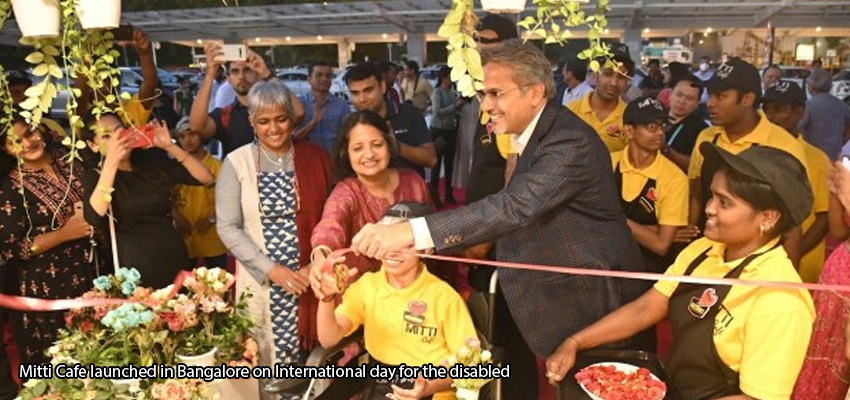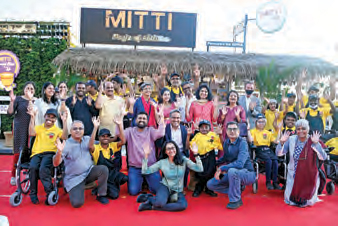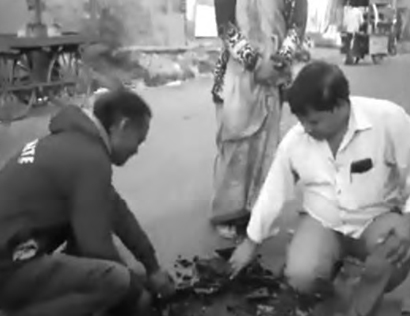
CORPORATE CITIZEN CLAPS FOR THE COLLABORATIVE INITIATIVE BETWEEN THE KEMPEGOWDA INTERNATIONAL AIRPORT, BENGALURU (BLR AIRPORT) AND MITTI CAFÉ IN LAUNCHING TWO OF THEIR CAFES AT THE AIRPORT PRECINCTS.
 A Mitti Cafe celebration
A Mitti Cafe celebration
More specifically, the launch commemorated the International Day of Persons with disabilities on December 3rd, bringing to the fore Mitti Café’s vision of inclusivity for people with special needs. The cafes will be open 24/7 and have Braille instructions, placards, sign language interpreters, and ramps. Mitti Cafes run on a partnership model across corporates, hospitals, & colleges. Adding the airport space has enabled public access and lent another dimension to CEO and Founder Alina Alam’s brainchild, Mitti Café, and its social entrepreneurial network. Mitti Social Initiatives Foundation runs 25 cafes across India and employs differently-abled people as a non-profit organization. The launch of the two cafes in a public space as extensive as an airport adds to Alina and her team’s journey in sensitizing and sending out a strong message of inclusivity for individuals with special needs. The newly launched Mitti Cafés at the airport also spreads hope amongst the physically challenged by offering economic and social opportunities, especially freshers recruited to run the airport outlets. Alina Alam, CEO and Founder of Mitti Café, has been featured in the Forbes list of ‘30 under 30’, for her impactful work. Mitti Cafés are managed by adults with disabilities across India and have served over 8 million meals and beverages, thus creating awareness about disabilities and inclusion via the meals served. The positive impacts of Mitti Café and its greater social mission of inclusivity have been recognized by the United Nations, Niti Aayog, the Commonwealth, UNESCO, The Times of India, Rotary, and Tiecon.
CORPORATE CITIZEN SLAPS THE COMPLACENCY AROUND ROADWORKS THAT HAS RESURFACED IN RECENT TIMES AND UNLEASHED NETIZENS AND CITIZENS TO EXPOSE THE AUTHORITIES IN UNIQUE WAYS.
 Agra citizens rip a badly made road
Agra citizens rip a badly made road
The question now arises on whether the citizen’s actions demand the authorities to reprimand them, as vandalizing public property is also a crime. The most recent video gone viral on social media from Agra show citizens pulling apart a poorly built road, apparently costing around Rs 3.8 crore, with minimal force. The citizens are seen making sarcastic overtures along with other passers-by on the government’s lack of safety in constructing roads. Their gesture indicates a deeper underlying despair of the corruption machinery that underlies similar developments in the country. In another similar incident in November, villagers in Pilibhit, Uttar Pradesh, ripped part of a road with their bare hands. The 7-kilometer road stretch has been built under the Pradhan Mantri Gramin Sadak Yojana (PMGSY), tendered at Rs 3.80 crore, connecting Puranpur with Bhagwantapur villages in the district. There are countless similar cases reported nationwide, including the June episode of the Jnana Bharthi main road in southern Bengaluru, which was asphalted at the cost of Rs 6 crore but caved in a few days after the PM’s scheduled visit to the city. Despite the poor state machinery catching the construction agencies, does it still give citizens the right to damage public property and impinge on taxpayers’ money spent on these development works? One netizen reiterated, “If the road is this bad, people will find out in a month.” While a majority of netizens collectively agreed on the negligence by authorities to build safer and more long-term pliable roads, does it still give citizens the right to vandalise public property? Are consumer forums almost dead, or have people lost faith in them? In the wake of aggrieved citizens and netizens releasing their ire in damaging our roadworks, it is a question to ponder, lest destructive citizen actions find other targets against the state machineries. The need is for a responsible democracy of the people and by the people.